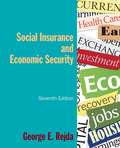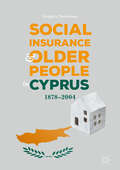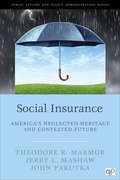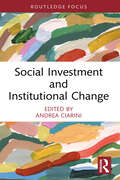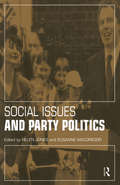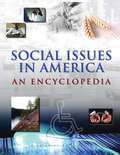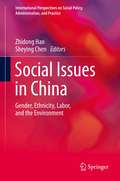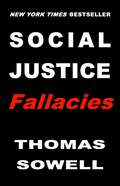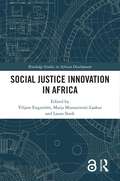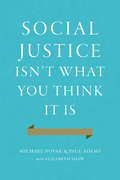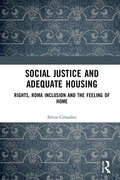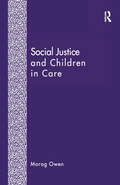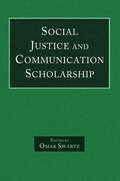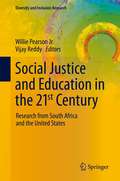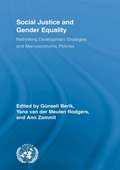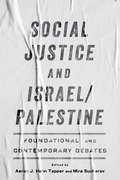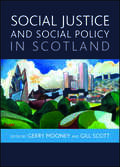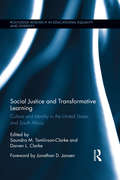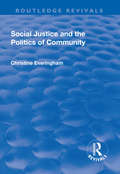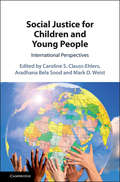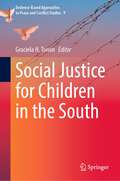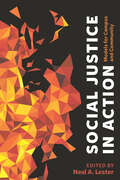- Table View
- List View
Social Inquiry and Bayesian Inference: Rethinking Qualitative Research (Strategies for Social Inquiry)
by Tasha Fairfield Andrew E. CharmanFairfield and Charman provide a modern, rigorous and intuitive methodology for case-study research to help social scientists and analysts make better inferences from qualitative evidence. The book develops concrete guidelines for conducting inference to best explanation given incomplete information; no previous exposure to Bayesian analysis or specialized mathematical skills are needed. Topics covered include constructing rival hypotheses that are neither too simple nor overly complex, assessing the inferential weight of evidence, counteracting cognitive biases, selecting cases, and iterating between theory development, data collection, and analysis. Extensive worked examples apply Bayesian guidelines, showcasing both exemplars of intuitive Bayesian reasoning and departures from Bayesian principles in published case studies drawn from process-tracing, comparative, and multimethod research. Beyond improving inference and analytic transparency, an overarching goal of this book is to revalue qualitative research and place it on more equal footing with respect to quantitative and experimental traditions by illustrating that Bayesianism provides a universally applicable inferential framework.
Social Insurance and Economic Security (Prentice-hall Series In Security And Insurance)
by George E. RejdaThis classic social insurance work has been updated to cover a decade of policy developments and the impact of the recent economic crisis.The book includes in-depth discussion of all major programs to reduce economic insecurity in the United States, including Social Security, Medicare, workers' compensation, unemployment compensation, and temporary disability insurance. The principles, characteristics, and policy issues associated with social insurance and public assistance programs are discussed in detail. The book examines each major cause of economic insecurity and analyzes the appropriate social insurance program for dealing with the problem.
Social Insurance and Older People in Cyprus: 1878–2004
by Gregory NeocleousThis book explores and analyses the evolution of social insurance in Cyprus from 1878, beginning with the arrival of the British after 300 years of Ottoman occupation. Neocleous follows the struggles of the labour movement which raised the issue of social insurance and initiated the campaign for its introduction in Cyprus. The book also evaluates the social conditions of the general population, with particular emphasis on older people, including a detailed study and analysis of their role and the movement for improved pensions. Taking into account historical sources, sociological theory, and anthropological concepts, this discourse is embedded within a rich historical framework, as well as an integration of the most contemporary scholarship in the field.
Social Insurance: America’s Neglected Heritage and Contested Future (The Institution for Social and Policy Studies )
by Jerry L. Mashaw Theodore R. Marmor John R. PakutkaWhat has America done to protect its citizens from life-changing but common risks such as death of a family breadwinner, ill health, disability, involuntary unemployment, outliving retirement savings, and birth into a poor family? Each, in its own way, burdens—and possibly devastates—unlucky individuals and families both emotionally and financially. It is the rare life that is untouched by one or more of these six threats. How do our current policies affect taxation, spending, and the economy, as well as prospects for individual lives? What more might these policies do to protect Americans? Rich in stories, data, and analysis, Social Insurance provides a strong intellectual foundation for understanding the history, economics, politics, and philosophy of America’s most important social insurance programs. This insightful work provides a unifying vision of these programs’ purposes and reminds us, amidst the confusing and often apocalyptic rhetoric, why we have the programs and policies we do, while arguing for reforms that preserve and enhance the protections in place.
Social Investment and Institutional Change (Social Welfare Around the World)
by Andrea CiariniThis book focuses on the main institutional changes affecting the Social Investment approach as the framework for the European social agenda. The contributions gathered address these issues from different angles, placing two fundamental issues at the centre of the analysis. The first concerns the promotion of the strategic actions of European institutions and the national governments aimed at making social investment a recovery priority in the Eurozone. The second aims to make the social investment approach compatible not only with a high road to growth, as it is in the Stock-Flow-Buffer scheme, but also with the right to balance market and non-market activities as a universal right linked to a different combination of working and living time. It will be of interest to all scholars and students of social policy and European politics.
Social Issues and Party Politics
by Helen Jones Susanne MacGregorAfter the landslide election of a new Labour government in May 1997, what are the key social policy issues and problems which the new government needs to address? Social Issues and Party Politics looks at the manifestos of the main parties and the way social issues figured in the 1997 election campaign and the early days of the new government. Chapters discuss green issues, the management and financing of welfare in contemporary Britain, the delivery of key services in health, education, employment, criminal justice, housing, personal social services, pensions and other areas of social security. The particular circumstances of Northern Ireland, Scotland and Wales are also examined. Social Issues and Party Politics takes social policy beyond the soundbite and provides a convincing and incisive analysis of current social policy approaches and inherited problems. It identifies the deep social questions which will need to be addressed if Labour is to deliver on its promise of a new Britain.
Social Issues in America: An Encyclopedia
by James CimentTruly comprehensive in scope - and arranged in A-Z format for quick access - this eight-volume set is a one-source reference for anyone researching the historical and contemporary details of more than 170 major issues confronting American society. Entries cover the full range of hotly contested social issues - including economic, scientific, environmental, criminal, legal, security, health, and media topics. Each entry discusses the historical origins of the problem or debate; past means used to deal with the issue; the current controversy surrounding the issue from all perspectives; and the near-term and future implications for society. In addition, each entry includes a chronology, a bibliography, and a directory of Internet resources for further research as well as primary documents and statistical tables highlighting the debates.
Social Issues in China: Gender, Ethnicity, Labor, and the Environment
by Zhidong Hao Sheying ChenSince 1978, the opening up and reform in China has brought tremendous economic and social changes. While China's economic progress has been commendable, the social problems that go with economic changes have raised serious concerns. Some of those concerns are related to gender, ethnic, labor, and environmental issues. This book is about what has happened in these arenas in China since the opening up and reform in 1978. The study of gender, ethnicity, labor, and environment touches on some of the fundamental problems of modernization, especially the development of individuals and groups. So even though gender, ethnicity, labor, and environment seem to be separate issues, they are in fact related in some fundamental ways. That's what this book will explore as well. To understand is one thing and to do is another. This book also incorporates studies of NGO practices to see how NGOs have helped in transforming gender, ethnic, labor, and environment interplay. Our study of NGOs in helping improve such interplay sheds light on how specifically civil society can prod the state to transform social relations for the better. This book is an attempt to assess the changes, both positive and negative, in gender, ethnic, ethnic, and environmental relations in China especially in the past 30 years of opening up and reform, especially regarding national identity formation.
Social Issues in IMF-Supported Programs
by Sanjeev Gupta Marijn Verhoeven Louis Dicks-Mireaux Ritha Khemani Calvin McdonaldThis paper reviews the IMF's policy advice in two areas of social policy: social safety nets and spending on education and health care. It was initiated as part of the work by the World Bank and IMF to strengthen the poverty focus of adjustment programmes in low-income countries. It looks at the lessons learnt from experience and sets out proposals for strengthening the social content of IMF supported programmes.
Social Justice Fallacies
by Thomas SowellIn this instant New York Times bestseller, renowned economist Thomas Sowell demolishes the myths that underpin the social justice movement The quest for social justice is a powerful crusade of our time, with an appeal to many different people, for many different reasons. But those who use the same words do not always present the same meanings. Clarifying those meanings is the first step toward finding out what we agree on and disagree on. From there, it is largely a question of what the facts are. Social Justice Fallacies reveals how many things that are thought to be true simply cannot stand up to documented facts, which are often the opposite of what is widely believed. However attractive the social justice vision, the crucial question is whether the social justice agenda will get us to the fulfillment of that vision. History shows that the social justice agenda has often led in the opposite direction, sometimes with catastrophic consequences. More things are involved besides simply mistakes. All human beings are fallible, and social justice advocates may not necessarily make any more mistakes than others. But crusaders with an utter certainty about their mission are often undeterred by obstacles, evidence or even fatal dangers. That is where much of the Western world is today. The question is whether we will continue on heedlessly, past the point of no return.
Social Justice Goes To Church: The New Left In Modern American Evangelicalism
by Jon HarrisIn order to understand why so many evangelicals recently support left-leaning political causes, it is important to know a little history. In the 1970s, many campus radicals raised in Christian homes brought neo-Marxist ideas from college back to church with them. At first, figures like Jim Wallis, Ron Sider, and Richard Mouw made great gains for their progressive evangelical cause. But, after the defeat of Jimmy Carter, the religious right stole the headlines. Today, a new crop of mainstream evangelicals has taken up the cause of the New Left whether they know it or not. As pro-life evangelicals rush to support movements like #BlackLivesMatter and #MeToo, it is important to realize they are walking in footprints already laid down. Their mission may be more successful, but it is not new. To understand where the evangelical social justice movement is heading, it is vital to understand the origins of the movement. Social Justice Goes to Church: The New Left in Modern American Evangelicalism answers, from a historical perspective, the vital question, "Why are American evangelicals moving Left?"
Social Justice Innovation in Africa (Routledge Studies in African Development)
by Laura Stark Maija Mustaniemi-Laakso Viljam EngströmAdopting a multidisciplinary approach, this book discusses the potential of social innovation in the pursuit of social justice in Africa. In the twenty-first century, social innovation and entrepreneurship have attracted renewed attention as a way of promoting social justice and addressing challenges of poverty and inequality.Drawing on perspectives from human rights, economics, business, development studies and anthropology, this book illustrates the entangled relationship between societal areas and activities, as well as different actors (individuals, communities, business actors, non-governmental organisations and public authorities) in social innovation. It identifies various models of social innovation, ranging from grassroots initiatives to public policymaking, and discusses their impact on socioeconomic welfare. It analyses a broad range of original research data and incorporates localised understandings of social innovation, highlighting both the empowering potential of social innovation and the possibility that it could sustain or create inequalities. As such, this book deepens an understanding of what makes social innovation ‘social’ and ‘just’.Arguing that social justice innovation can only be understood in context, this book will be of interest for researchers and policy makers across the fields of human rights, economics, business, development studies, anthropology and African studies.
Social Justice Isn't What You Think It Is
by Michael Novak Elizabeth Shaw Paul AdamsWhat is social justice? For Friedrich Hayek, it was a mirage-a meaningless, ideological, incoherent, vacuous cliché. He believed the term should be avoided, abandoned, and allowed to die a natural death. For its proponents, social justice is a catchall term that can be used to justify any progressive-sounding government program. It endures because it venerates its champions and brands its opponents as supporters of social injustice, and thus as enemies of humankind. As an ideological marker, social justice always works best when it is not too sharply defined.In Social Justice Isn't What You Think It Is, Michael Novak and Paul Adams seek to clarify the true meaning of social justice and to rescue it from its ideological captors. In examining figures ranging from Antonio Rosmini, Abraham Lincoln, and Hayek, to Popes Leo XIII, John Paul II, and Francis, the authors reveal that social justice is not a synonym for "progressive" government as we have come to believe. Rather, it is a virtue rooted in Catholic social teaching and developed as an alternative to the unchecked power of the state. Almost all social workers see themselves as progressives, not conservatives. Yet many of their "best practices" aim to empower families and local communities. They stress not individual or state, but the vast social space between them. Left and right surprisingly meet.In this surprising reintroduction of its original intention, social justice represents an immensely powerful virtue for nurturing personal responsibility and building the human communities that can counter the widespread surrender to an ever-growing state.
Social Justice and Adequate Housing: Rights, Roma Inclusion and the Feeling of Home
by Silvia CittadiniThis book presents a critical analysis of the concept of ‘adequate housing’. While the concept of adequate housing is used largely as a normative standard in the protection of housing rights and in the implementation of housing policies, its apparent objectivity and universality have never been questioned by political and legal theory. This book analyses and challenges the understanding of this term in law and politics by investigating its relationship with the idea of ‘home’. ‘It is necessary to provide them with adequate housing!’ It is very common to hear this phrase when dealing with housing poverty, especially in relation to migrants, minorities, indigenous and other subaltern groups are concerned. But what does "adequate housing" mean? This book tackles this issue by proposing a critical analysis of this concept and of its use in the development of housing policies addressing the subaltern group par excellence in Europe, Roma. In so doing, it focuses on the lives of Roma and Sinti in Italy who have been the target of inclusion policies. Highlighting the emotional connection to housing, and dismantling some of the most ‘common sense’ ideas about Roma, it offers a radical revision of how social justice in the housing sector might be refigured. This book will be invaluable for scholars and students working on relevant themes in socio and critical legal studies, sociology, human rights, urban studies, human geography and Romani studies
Social Justice and Children in Care
by Morag OwenCan justice be achieved in voluntary cases - or is it purely a matter for courts to determine? Using a multi-disciplinary framework, which has at its centre a philosophical/anthropological view of social work as a moral practice, the author explores the notion of justice in public child care. The problem of parents’ and children’s rights is addressed, first of all in the legal context of care proceedings and then in the social work setting of voluntary care. Forty-six difficult cases are examined to see how decisions are made and implemented. In the final analysis the dimensions of social and legal justice are charted in a way which may contribute to general understanding of these issues and some suggestions are offered about how social work may move forward in response to legitimate criticism.
Social Justice and Communication Scholarship (Routledge Communication Series)
by Omar SwartzSocial Justice and Communication Scholarship explores the role of communication in framing and contributing to issues of social justice. This collection, a first on the subject of communication and social justice, investigates the theoretical and practical ways in which communication scholarship can enable inclusive and equitable communities within American society. It analyzes ways in which to construct communities that protect individual freedom while ensuring equality and dignity to everyone. In this unique anthology, Swartz brings together both senior scholars and junior colleagues to represent diverse applications of communication to issues of social justice. He supports partisan scholarship in order to revitalize intellectual activity and social commitment toward creating a progressive society. As a result; the volume serves the heuristic function of posing new research questions. In addition to its relevance within the field of communication, Social Justice and Communication Scholarship will be of interest in many of the humanities and social sciences, as research on the theme of social justice transcends disciplinary boundaries. The volume is particularly well suited for use in undergraduate and graduate courses in communication, rhetoric and composition, journalism, American studies, and cultural studies.
Social Justice and Education in the 21st Century: Research from South Africa and the United States (Diversity and Inclusion Research)
by Vijay Reddy Willie Pearson Jr.The world is not an equal place. There are high- and low-income countries and high- and low-income households. For each group, there are differential educational opportunities, leading to differential educational outcomes and differential labor market opportunities. This pattern often reproduces the privileges and inequalities of groups in a society. This book explores this differentiation in education from a social justice lens. Comparing the United States and South Africa, this book analyzes each country’s developmental thinking on education, from human capital and human rights approaches, in both primary and higher education. The enclosed contributions draw from different disciplines including legal studies, sociology, psychology, computer science and public policy.
Social Justice and Gender Equality: Rethinking Development Strategies and Macroeconomic Policies (Routledge/UNRISD Research in Gender and Development)
by Gunseli Berik Yana van der Meulen Rodgers Ann ZammitThe contributors to this edited volume explore the effects of various development strategies and associated macroeconomic policies on women’s well-being and progress towards gender equality. Detailed analyses of major UN reports on gender reveal the different approaches to assessing absolute and relative progress for women and the need to take into account the specifics of policy regimes when making such assessments. The book argues that neoliberal policies, especially the liberalization of trade and investment, make it difficult to close gender wage and earnings gaps, and new gender sensitive policies need to be devised. These and other issues are all examined in more detail in several gendered development histories of countries from Latin America and Asia.
Social Justice and Israel/Palestine: Foundational and Contemporary Debates
by Aaron J. Hahn Tapper Mira SucharovThis book critically assesses a series of complex and topical debates helping readers to make sense of the politics surrounding the Israeli-Palestinian relationship. Each chapter considers one topic, represented by two or three essays offered in conversation with one another. Together, these essays advance different perspectives; in some cases they are complementary and in others they are oppositional. Topics include scholarly and activist interpretations of narratives in the context of Israel/Palestine; the concept of self-determination for Jewish Israelis and Palestinians; the debate over settler-colonialism as an appropriate framework for interpreting the history of Israel/Palestine; and questions surrounding Jewish and Palestinian refugees and the impact of displacement, among others. Through these foundational and contemporary topics, readers will be challenged to critically examine the strengths and weaknesses of each position in light of scholarly debates rooted in social justice and helped to gain a deeper understanding of the relationship between Israelis and Palestinians in order to see a path forward toward justice for all.
Social Justice and Social Policy in Scotland
by Gerry Mooney Gill ScottSocial justice and social policy in Scotland offers a critical engagement with the state of social policy in one of the devolved nations of the UK, a decade after the introduction of devolution. Promoting greater social justice has been held up as a key vision of successive Scottish administrations since devolution began. It is argued throughout this important book that the analysis of Scottish social policy must therefore be located in wider debates around social injustice as well as about how the devolution process affects the making, implementation and impact of social policy. Social justice and social policy in Scotland focuses on a diverse range of topics and issues, including income inequalities, work and welfare, criminal justice, housing, education, health and poverty, each reflecting the themes of social inequality and social justice. This book will be essential reading for academics, researchers, policy makers and practitioners as well as students of social policy and of society in Scotland and other devolved nations.
Social Justice and Transformative Learning: Culture and Identity in the United States and South Africa (Routledge Research in Educational Equality and Diversity #6)
by Saundra M. Tomlinson-Clarke Darren L. ClarkeThe similarities between the United States and South Africa with respect to race, power, oppression and economic inequities are striking, and a better understanding of these parallels can provide educational gains for students and educators in both countries. Through shared experiences and perspectives, this volume presents scholarly work from U.S. and South African scholars that advance educational practice in support of social justice and transformative learning. It provides a comprehensive framework for developing transformational learning experiences that facilitates leadership for social justice, and a deeper understanding of the factors influencing personal, national and global identity.
Social Justice and the Politics of Community (Welfare And Society Ser.)
by Christine EveringhamThis title was first published in 2003. Social welfare is the focus of much discussion and there is a broad spectrum of political opinion that agrees on the need for urgent reform. The literature informing these policy debates draws on a diversity of theoretical traditions and discourses concerned with remaking community, yet there has been no in-depth, coherent political analysis of these various positions. This captivating volume provides such an analysis, enabling the diverse discourses informing current social policy debates to be identified and understood in broader perspective. The book frames the debates within the context of globalization and the accompanying shift in focus of social policy from issues of social justice to questions of social order. It identifies 'the community' as both the site of today's social problems and the main tool that governments have at their disposal to address these problems. This portrayal of 'the community' is both theorized and illustrated with empirical material drawn from the Australian experience of community action.
Social Justice for Children and Young People: International Perspectives
by Mark D. Weist Clauss-Ehlers, Caroline S. Aradhana Bela SoodAccording to the Convention on the Rights of the Child, the goal of a social justice approach for children is to ensure that children “are better served and protected by justice systems, including the security and social welfare sectors.” Despite this worthy goal, the UN documents how children are rarely viewed as stakeholders in justice rules of law; child justice issues are often dealt with separate from larger justice and security issues; and when justice issues for children are addressed, it is often through a siloed, rather than a comprehensive approach. This volume actively challenges the current youth social justice paradigm through terminology and new approaches that place children and young people front and center in the social justice conversation. Through international consideration, children and young people worldwide are incorporated into the social justice conversation.
Social Justice for Children in the South (Evidence-Based Approaches to Peace and Conflict Studies #9)
by Graciela H. TononThis book considers that contextual factors are important for the achievement of social justice and it recognizes that vulnerability to which children are exposed is a phenomenon throughout the planet, particularly in the South. It presents a theoretical review of social justice as well as different situations of vulnerability children experience in their daily lives in which they can be injured, affecting their well-being and the exercise of their rights. It examines the impact of the COVID-19 pandemic on children, considered as a vulnerable group warranting special social policy considerations. It also presents the need to change power structures in knowledge production and decision-making processes to achieve social justice for children; the importance of investing in children; the exclusion of children from participation in certain activities and the shame of not being able to participate in equal conditions with others; the lives of migrant children belonging to ethnic minorities exposed to language barriers and access to technological devices; and the analysis of the process of social re-integration of children from conditions of armed conflict. The book concludes that governments need to assume social justice as part of universal human interests, providing security, conditions for well-being, and guaranteeing social justice for all children.
Social Justice in Action: Models for Campus and Community
by Neal A. LesterAddressing both veterans of justice work and novices seeking points of entry, the essays in this volume showcase practical approaches to diversity, equity, and inclusion: ways to build community, earn trust, tell unheard stories, and develop solutions to problems. Emphasizing values such as empathy, self-reflection, and integrity, the volume is rooted in humanities work but also features contributions from fields as diverse as the performing arts, architecture, and evolutionary biology and represents settings beyond the college campus, such as schools, libraries, museums, and prisons. While bringing insights from higher education, it critiques the system as well, exploring the ways that institutions reinforce power structures and exclude marginalized voices. Interspersed with the essays, brief reflections by activists and artists offer testimony and inspiration.

